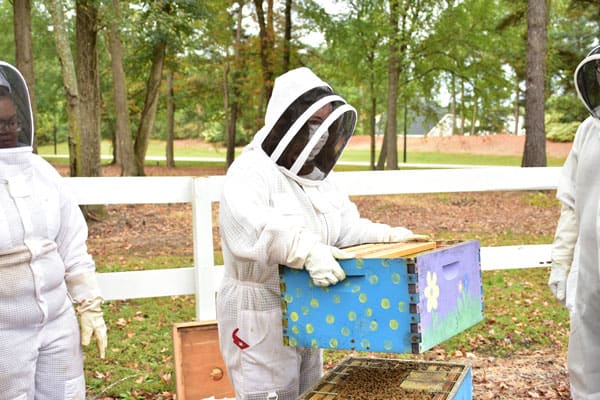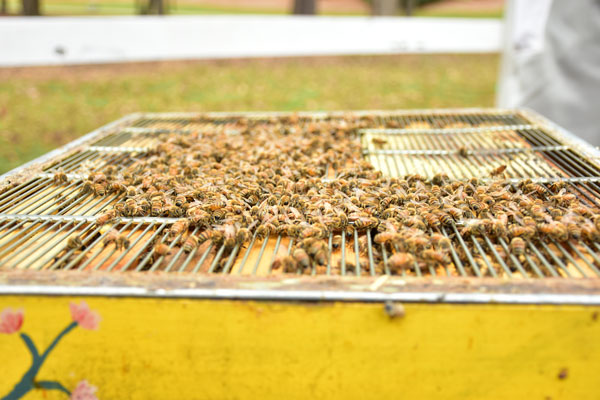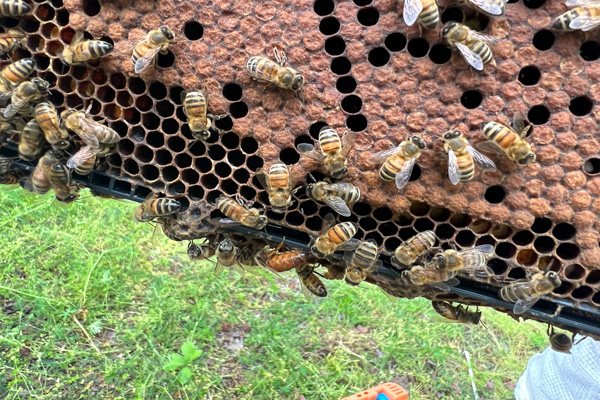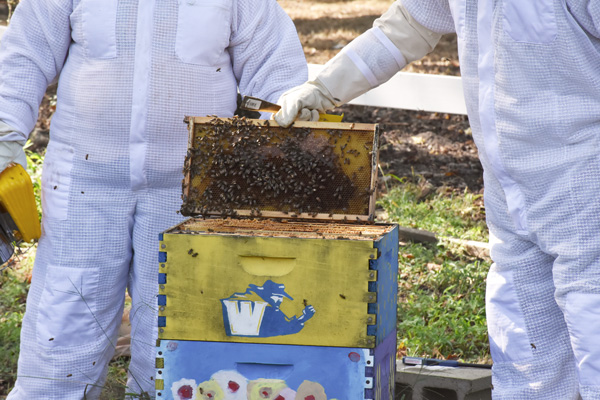NC Wesleyan is a Bee Campus!
1 of 8 Universities in North Carolina!
1 of 170 in the United States!
North Carolina Wesleyan University is an affiliate of the Bee Campus USA program, designed to marshal the strengths of educational campuses for the benefit of pollinators. NCWU joins many other cities and campuses across the country in improving their landscapes for pollinators.
NCWU is 1 of only 8 universities in the entire state of North Carolina with this Bee Campus USA distinction and 1 of 170 in the United States.
About Our Bee Program
NC Wesleyan strives to incorporate biodiversity throughout our campus and recognize the vital importance of bees to our environment, food supply and health.
With the help of Dr. Carl Lewis, NCWU’s Bee Campus USA Program Coordinator and Assistant Professor of Criminal Justice, NCWU has created and maintained a pollinator garden for the past several years which contains three active bee hives. The concept of having bee hives on campus was the result of the work of alumna, Carolynn Davern ’18. Caitlin BrabbleRose ‘18, along with several other founding members, helped create The B Club during their time at Wesleyan. This student organization, led by Dr. Ayra Sundbom, allows students to perform research while learning about animals and biodiversity. The “B” in B Club stands for more than just bees— Bees, Bats, Birds, Butterflies and Beasts.
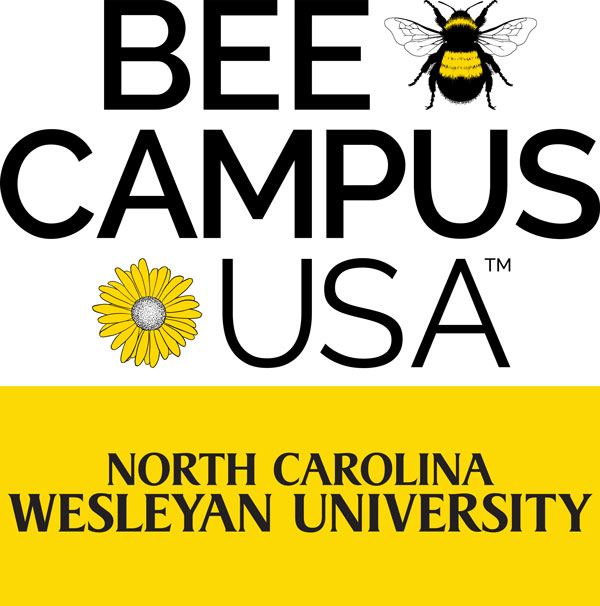
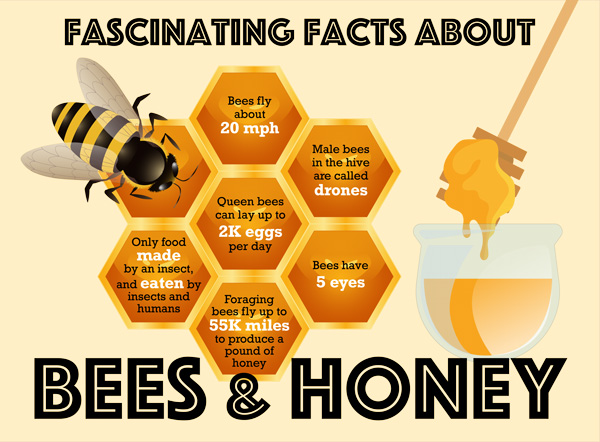
Why Are Native Bees So Important to Our Environment?
Bees transfer pollen between flowers, enabling the incredible diversity of plants on our planet to flower and fruit. Pollinators are a keystone species in essentially every ecosystem on earth, enabling the reproduction of over 85% of all flowering plants and 67% of agricultural crops. In addition to the well-known honey bee (Apis mellifera), a species brought to the United States from Europe, there are more than 20,000 described species of bees globally, and around 3,600 species of bees native to the United States. While bees are the most important pollinator, butterflies, moths, beetles, flies, wasps, bats, and hummingbirds also contribute to pollination.
Facts About Pollinator Decline.
Research has shown significant declines in native pollinator population sizes and ranges globally with up to 40% of pollinator species on earth at risk of extinction in the coming years as a result of habitat loss, the use of harmful pesticides, and climate change.
What are the pollinator efforts for our native bees?
Walking trail built on campus
With the help of local organizations like The Longleaf Foundation and The Nash County Tourism Authority, NC Wesleyan created a 3.2 mile/5K walking path in 2019 on the main University campus.
Safety features include:
- Lighting
- Footbridges (6) – Two of the footbridges were Eagle Scout Projects
- 911 Emergency Towers
- Benches at intervals throughout the trail
The walking trail also crosses the NCWU 18-hole disc golf course, campus access points and passes close to the NCWU beehives, and bat habitat nests.
Pollinator Habitat along the NCWU Walking Trail
The assistance of the NC Forestry Service was obtained in the identification of the trees along and throughout the walking trail. The trees were then identified with signage identifying them as being part of the Arch Sharer Arboretum with a QR code provided for additional information (see below example).
Trees along the walking trail that help with pollination
- Sweetgum
- Red oak
- Loblolly pine
- Black cherry
- Pecan
- Laurel oak
- Yellow poplar
- Southern live oak
- Water oak
- American holly
- Crape myrtle
- Willow oak
- Longleaf pine
- Red maple
- White oak
- Sourwood
- Black gum
- Southern red oak
- Bradford pear
- Eastern red cedar
- Western red cedar
- Chinese holly
- Japanese cherry
Plants and flowers along the trail that help with pollination
- Muscadine grape vines
- Spiny sowthistle
- China rose
- Rose of Sharon
- Gardenia
- Orchard grass
- Carolina cherry laurel
- Creeping juniper
- Giant cane
- White clover
- Carolina bristlemallow
- Dutch lily
- Siperian lily
- Carolina cranes bill
- Dandelion
- Heavenly bamboo
- Virginia buttonweed
- Hop trefoil
- Autumn hawkbit
- Virginia pepperweed
- Cutleaf evening primrose
- Rice cutgrass
- Clasping vensus’s looking glass
- Canada lettus
- Sweet vernal grass
- Hairy buttercup
- Blue toad flax
- American burnweed
- Japanese honeysuckle
- Spiny southistle
- Horseweed
- Sheep sorrel
- Poverty grass
- Common greenbrier
- Poison ivy
- Green carpet weed
- Marsh cudweed
- Common blue violet
- Chinese fringe flower
- Perennial ryegrass
- Virginia dwarf dandelion
- Henbit
- Japanese clover
- Carolina horsenettle
- Autumn hawkbit
- Annual blue-eyed grass
- Bitter sneezeweed
NCWU "B" Club promotes biodiversity and preservation on campus
The “B” Club at NC Wesleyan promotes ideas that bring new animals and plants to campus as well as educates the campus and community on conservation, preservation, and biodiversity. The “B” Club also acts as an advocate for sustainability, environmental protection and conservation. They maintain the bee hive on campus along with maintaining future birdhouses, bird baths, and plants that are brought to campus for the attraction of bats, birds, and butterflies.
Check them out on Facebook:
@ncwesleyan Busy as a bee this summer in our on-campus pollinator garden! 🍯 🐝 #pollination #pollinatorsareimportant #pollinator #pollinators #pollinatorgarden #bee #bees #honeybee #honey #beekeeper #beekeeping #beekeepersoftiktok ♬ 3 minutes cooking style pop / cooking / sweets(957554) - ArcTracks
What is NCWU Doing to Take Care of Our Community?
NC Wesleyan takes pride in its commitment to minimizing hazards to pollinators by using nearly no neonicotinoids or other potentially dangerous pesticides. To raise awareness about the plight of pollinators, we share information with the local campus and external communities. Going forward, NCWU intends to initiate the following:
- NCWU’s Integrated Pest Management Plan
- A list of native plants incorporated into the campus landscape including their bloom time and habitat needs
- Links to student and faculty research into pollinator issues
What are Our Education Interactions on Campus?
As a Bee Campus, NC Wesleyan is committed to offering education to students and community members about the region’s native pollinators. This education might be in the form of biology labs, research contributions, environmental science service learning, Continuing Ed seminars, and Bee Units offered to nearby schools.
Environmental Science and Biology students study native bees and gather data in spring-time bee surveys and learn about our native pollinators.
From the Beehive to the Jar!
The NC Wesleyan “B” Club Students and faculty/staff take part in a group effort extracting the honey from the 3 pollinator garden hives. The honey is pulled up to 2-3 times per year and as of 2023, yields close to 60-70 pounds of honey.
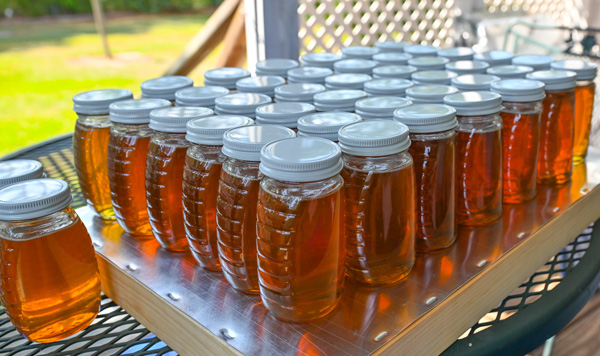
Purchase Bishops' Honey, Help Our Bee Campus Cause
Our local, organic Bishops’ Honey can be purchased from the University and helps fund the efforts of the Bee program. There is usually a limited supply, so get yours today!
Only $6.95
Now available in our University Bookstore and online!
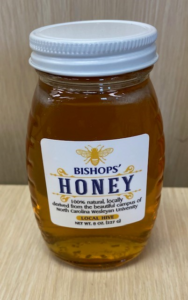
About Bee Campus USA
Thinking globally and acting locally, Bee Campus USA provides a framework for communities to work together to conserve native pollinators by increasing the abundance of native plants, providing nest sites, and reducing the use of pesticides. Bee Campus USA and Bee City USA are initiatives of the Xerces Society for Invertebrate Conservation.
For more information about Bee Campus USA, visit beecityusa.org.
For more information about the Xerces Society, visit xerces.org.
For information about four simple ways to help pollinators, visit xerces.org/bringbackthepollinators
Contact Our Bee Campus USA Program Coordinator:
To learn more about North Carolina Wesleyan University’s
Bee Campus USA program, contact:
Dr. Carl Lewis
Bee Campus USA Program Coordinator/Assistant Professor of Criminal Justice
clewis@ncwu.edu




